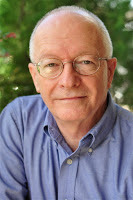Edie Melson's Blog, page 162
May 26, 2021
Don’t Be Afraid

by Henry McLaughlin @RiverBendSagas
In 2020 and so far in 2021, these strangest of years, we’ve had to deal with restrictions on our activities, our jobs, our churches, our contact with family, and a bizarre election. Some have seen loved ones pass away. Others have struggled through Covid itself. Some have lost jobs or closed their businesses. We’ve all been touched.
I’m sure many of us may have asked, or heard others ask, “God, where are you in all of this? Why did you let this happen?”
The Bible tells us we will have trouble in this world. Not one of us is immune. We’re not wrapped in bubble wrap, much as we might like to be. We live in a broken world, and we are broken people. Not one of us is perfect. And we have an enemy who is out to destroy us any way he can. Satan attacks our thoughts, our finances, our relationships, our families, our homes, our jobs, our churches. He doesn’t care which weapon works. He’ll keep attacking until he finds the one that pulls us away from God.
Even if we call ourselves Christians and profess to be saved, we will not escape storms. But God has equipped us to handle any storms that come our way. If we trust in him and not our own understanding.
Storms and tough times are going to come in life. They are the opportunity to see how strong our faith is and how strong God is. Storms are a way for him to produce much good.
And God is right here with us. Psalm 23 tells us God is with us as we walk through the valley of the shadow of death. We will experience evil, but we do not need to fear it because Jesus is there. The key word in this verse is “through.” With God by our side, we go through the valley of death. We don’t stay there, unless we choose to give in to the fear and let it paralyze us.
Recently, I heard a minister preach that fear is a choice, not an obligation. Fear is optional, like having Brussels sprouts on pizza is optional. And about as appetizing.
There is a verse of Scripture I believe can give us much strength during this most abnormal year. It is from the book of Isaiah in the Old Testament: When you go through deep waters, I will be with you. When you go through rivers of difficulty, you will not drown. When you walk through the fire of oppression, you will not be burned up; the flames will not consume you. Isaiah 43:2 (New Living Translation).
God is with us in the deep waters, in the difficult rivers, in the fires of oppression. We will not drown or be consumed by flames if we trust in him. Even when we don’t understand, please don’t choose fear.
The lack of fear is not the absence of trouble. The lack of fear results from an abundance of faith in God. Fear shrinks when faith grows. And faith grows when we listen to God and walk in his presence. Faith is a muscle we need to exercise.
Fear is an emotion. We can’t always control our emotions, but we can choose how we respond to them. Can we just choose faith over fear? Not in our own strength. We need to be daily building our faith, so we don’t cave into fear when it raises its ugly head. We build our faith muscle by spending time with God, conversing with him and his Holy Spirit through prayer, meditation, and studying his Word. One of the most important verses for this is 1 John 4:18 (New King James Version), Perfect Love casts out fear. Pondering God’s perfect love helps shrink the fear in my heart.
How can you exercise your faith muscle today?
TWEETABLE
Don't Be Afraid - Henry McLaughlin, @RiverBendSagas on @EdieMelson (Click to Tweet)
This blog is inspired, in part, by Preston Morrison, Senior Pastor of Gateway Church Scottsdale, AZ, from a sermon he gave at Gateway Church, Southlake, TX. Here is the link: Don’t Be Afraid.
 Henry’s debut novel, Journey to Riverbend, won the 2009 Operation First Novel contest.
Henry’s debut novel, Journey to Riverbend, won the 2009 Operation First Novel contest.Henry edits novels, leads critique groups, and teaches at conferences and workshops. He enjoys mentoring and coaching individual writers.
Connect with Henry on his BLOG, TWITTER and FACEBOOK.
May 25, 2021
Confessions of a Fiction Writing Addict

by DiAnn Mills @DiAnnMills
Fiction writing addicts tend to have common set of traits, and these are personal and professional. It’s who we are, how we think, and how we process information. Fiction writers are wired to juggle character, plot, emotion, dialogue, setting, and thoughts like priceless pieces of art.
Sometimes I look at the world as though I’m standing on my head. From there, I often find an advantage point, like exploring where a character has been and working my way backward. The experience affects sensory perception and results in metaphors and similes unique to a character and my voice. If you are a writer, try it. See if you don’t learn something new about your character and story.
One of the reasons writers enjoy writing in coffee houses is eavesdropping. Wait! You say. I thought the coffee and solitude paved the way for meaningful prose. And it does, but overhearing bits of juicy dialogue and noting body language is a field trip on improving our craft. Witty writers jot down what is said and how it’s said to use in current or future stories.
Stories are everywhere, from crowded grocery store lines to front page media news. Zoos, museums, and high school sports offer incredible ideas. Every breath we experience can become an element in a potential story. A novelist’s job is to slip stress, tension, and conflict into the lives of three-dimensional characters.
Busy crowds show motivation. If you have doubts, watch people elbow through a mass of young and old. They have a place to go and nothing will stop them. Take the time to count how many women with strollers don’t really have a baby inside but are using it to push through others. What about people with pets? Tugging along kids? Escorting an elderly person? The novelist knows the inner person is revealed in what is shown to others.
Caffeine wires most of us. While some rely on tea or soft drinks, I’m a coffee drinker and behave as though caffeine is directly wired to my creativity.
Family and friends call us quirky or eccentric because we tend to live in our own worlds. And we like it. Who wants to resemble everyone else?
Viewing movies and TV shows can be frustrating to those around us. But we can’t help editing dialogue and plot—even giving away the ending.
Eating habits can be peculiar. When we’re zoned into writing, food may have little interest. Other times, we’re ravenous.
To sleep or not to sleep. Rarely do writers observe decent bedtimes or an appropriate hour to rise. Instead, we create in the stillness of late night after others are asleep or we’re up long before the rooster crows to get a head start on our work.
Leisure time and vacations may be nonexistent because our minds refuse to shut down. Relaxing, unless we’re exhausted, means another way to approach creativity. Our imaginations take over, and we really don’t mind.
No task or time is ever wasted. Our best ideas may come in the shower, cleaning, pulling weeds, pumping gas, taking out the trash, and whatever else claims our time.
Are you a fiction writer? Do you have any bizarre traits that make others laugh or shake their heads at the absurdity? If so, comment below about how you demonstrate peculiar behavior.
TWEETABLE
Confessions of a Fiction Writing Addict - @DiAnnMills on @EdieMelson (Click to Tweet)
 DiAnn Mills is a bestselling author who believes her readers should expect an adventure. She creates action-packed, suspense-filled novels to thrill readers. Her titles have appeared on the CBA and ECPA bestseller lists; won two Christy Awards; and been finalists for the RITA, Daphne Du Maurier, Inspirational Readers’ Choice, and Carol award contests.
DiAnn Mills is a bestselling author who believes her readers should expect an adventure. She creates action-packed, suspense-filled novels to thrill readers. Her titles have appeared on the CBA and ECPA bestseller lists; won two Christy Awards; and been finalists for the RITA, Daphne Du Maurier, Inspirational Readers’ Choice, and Carol award contests. She is the director of the Blue Ridge Mountain Christian Writers Conference, Mountainside Marketing Retreat, and Mountainside Novelist Retreat with social media specialist Edie Melson. Connect here: DiAnnMills.com
May 24, 2021
Dipping The Quill Deeper: Overlooking Those Nasty Book Reviews

by Eva Marie Everson
Let’s be honest—we love our own work. We gave birth to it, after all. We slaved over it. Bravely took it to our critique groups and partners and allowed friends and family to read it before sending it to the publisher. The publisher loved it (obviously). The editor at the publishing house helped to make it the best it could be, and they loved it too.
Once the book comes out, we anxiously await the reviews. We sometimes even pay for them—offering our hard-earned coins by sending Advanced Reader Copies (ARCS) to services with folks who love to read and who then post their honest reviews to their social media sites.
The first reviews are released, and we are thrilled! They’ve mostly come from our hand-selected “street team” but we are still delighted. They are, by and large, 4- and 5-star reviews. When we read these lovely paragraphs of praise our shoulders straighten as our chest puffs out. Yes! The reader “got it.” They understood the message of our work. They enjoyed the way our words flowed, the lyrical melody they played. Oh, yes, yes, yes!
And then . . . someone along the way has the audacity to tell us that our baby isn’t as pretty as we believed. Or, they say things about our baby that just isn’t true. What do you do? What . . . do . . . you . . . do?
First . . .
Before I go any further, allow me to share some of the funniest one-star reviews I’ve had on my own books:I’m giving it a one-star because I didn’t have time to read it.I’m giving it “this rating” because I bought it for school but never opened it.This was better than having nothing to read at all.The last chapter was missing on my kindle.The author introduced too much Bible worship and psalm quoting.There was not enough of a faith element.Now, if you will, allow me to share some of the best 1- and 2- star reviews a few author friends of mine have received.I only bought this book because my niece is on the front cover.Enough military jargon to choke a horse. (Eva Marie: it was a military-based book.)I love the work of [writer’s name here], but she wrote this book in first person.I couldn’t put this book down … but I didn’t like the ending. Please write a sequel.This was a great book! (Eva Marie: so then why the one-star review?)I spent about as much on the book as a Starbucks coffee, and feel like I spilled the coffee and wasted the $4.00.I guess I will have to try something else from this author. I [sic] going out to eat a donut now.Understand—those reviews were for books that were published by top houses, sold well, and written by some of the best writers in our industry.
Now …
What do you do when you receive these reviews? Allow me to give you my best advice as well as the advice of those I’ve spoken to about this:Do nothing. Oh, don’t get me wrong. You will be upset. You’re going to pout, and you’re going to call your best friend and you’ll tell them why this person should be booed off the face of the planet. But that’s all you should do. In fact, recently while scanning my Goodreads reviews (and always commenting to and thanking the reviewers for their glowing reports), I came across a less-than-complimentary review. It wasn’t a bad review; it simply wasn’t a glowing review. I clicked on the comment box to thank the reader when suddenly a Goodreads posted note came up. It said: Okay. You received a bad review. It happens. Don’t respond. Don’t even say anything nice. Just ignore it. (Or something to that effect.) So, that’s what I did. As badly as I wanted to respond with kindness, I said nothing. (Note: Amazon has removed the feature that allows authors to respond. This is probably . . . no, definitely . . . a good thing.)Ignore bad reviews. Don't engage. Love them in this by steering clear. You, the object of their abuse, are not the person to fix their issue. Many trolls live to antagonize. If you engage, you are only feeding their addiction.Honestly, don't even read your reviews. Instead, listen to your editors and agent about the direction of your books and writing.Remember, if all of your reviews are 4- and 5-star reviews, it is then assumed that you paid for these and they are not legit. Receiving 3- and 2- and 1-star reviews means you are a real author.Go eat donut now.Finally . . .
As Goodreads said: It happens. Expect bad reviews for your precious baby. And, if I could offer one simple bit of advice more—when you read them, pray for the person who left the review. Because, typically, it’s not your baby they don’t like. Your work struck a nerve of some kind. This is their issue. Not yours. So, pray for them. Jesus knows best of all what rejection feels like, so . . . leave it to Him.
TWEETABLEDipping The Quill Deeper: Overlooking Those Nasty Book Reviews - Eva Marie Everson on @EdieMelson (Click to Tweet)
 Eva Marie Everson is the president of Word Weavers International and the director of its two conferences. She is the multiple award-winning author of nearly 40 works and has received awards as a speaker and Bible teacher. Eva Marie is often seen at writers conferences across the States. She served as a mentor for Jerry B. Jenkins’ Christian Writers Guild for several years, and taught as a guest professor at Taylor University in 2011. She and her husband make their home in Central Florida where they enjoy their grandchildren. They are owned by one small dog and a princess cat.
Eva Marie Everson is the president of Word Weavers International and the director of its two conferences. She is the multiple award-winning author of nearly 40 works and has received awards as a speaker and Bible teacher. Eva Marie is often seen at writers conferences across the States. She served as a mentor for Jerry B. Jenkins’ Christian Writers Guild for several years, and taught as a guest professor at Taylor University in 2011. She and her husband make their home in Central Florida where they enjoy their grandchildren. They are owned by one small dog and a princess cat.
May 23, 2021
Writing Research: Do You Delve or Dive?

by Ane Mulligan @AneMulligan
Whether you write contemporary or historical fiction, you will need to do research. Otherwise, you could find yourself fifty-thousand words into a manuscript and discover you've written your characters into a conundrum without a way out. I know from experience.
Now some writers do all their research before they start writing, taking trips to near and faraway places before they begin internet searches. For those of us who are more seat-of-the-pants writers, that's not always an option. We might have the location in mind and could do a road trip, but we don't always know WHAT we need to research.
I must admit, delving can cause you to change somethign already written. But that's part of being a SOTP writer. Case in point: I was working on the second book in my Georgia Magnolias series, On Sugar Hill. The series is set during the early years of the Great Depression. Although I was raised in the South, it was not in Georgia. I grew up with electricity. Atlanta and other large cities had electricity. I had no idea rural Georgia did not have any until the 1950s. That tidbit came up when I was researching another aspect. Talk about being gobsmacked!
Warning: once can get lost in research, especially if you love it. But whether you delve or dive, I have accumulated a list of sites that has helped me and thought I'd share it. All of these are free sites to use.
Valuable Research Sites for Writers
Online Etymology Dictionary: This is the place to check if the saying or word you use is appropriate for the timeline of your novel. There is nothing worse than reading historical fiction and coming across a word that is or sounds too modern. It yanks you right out of the story.
The People History: Gives you a good overview the era and the decades, along with links to more detailed information, like This Day in History.
The Food Timeline: Here, you can research different foods like meats or grains, etc. and find out what was in common use during the timeline of your story. It also has recipes from different decades.
Glossary of Medical Terms of the 18th & 19th Centuries: This speaks for itself and is very helpful.
: I think names are important. Names create an image or personality in our characters. This site tells the origin and what the name means. Its sister site is for . Coupled with which divulges what people think of when they see or hear a name, these sites will help you find interesting names for your characters. You can also use the from 1880 on.
The Postal History Corner: This site gives the cost of postage and shows photos of the stamps.
The Idiom Site: This one is a bit of fun. You cannot only find idioms but give your own spin to them.
Century Past (newspapers): This site has a ton of great information besides newspapers, like historical articles.
Sunrise Sunset Calendars: You can make a calendar for the city, month, and year you need and print it. It lists places all over the world.
Time and Date: Choose the year, create, and print the calendar for your story.
These are a few of my favorites. Do you have some to share with me and our readers? Leave them in the comments.
TWEETABLE
Writing Research: Do you delve or dive? @AneMulligan on @EdieMelson (Click to Tweet)
 On Sugar Hill
releases June 1st
On Sugar Hill
releases June 1stShe traded Sugar Hill for Vaudeville. Now she’s back.
The day Cora Fitzgerald turned sixteen, she fled Sugar Hill for the bright lights of New York City, leaving behind her senator-father’s verbal abuse. But just as her career takes off, she’s summoned back home. And everything changes.
The stock market crashes. The senator is dead. Her mother is delusional, and her mute Aunt Clara pens novels that expose the town’s secrets. Then there’s Boone Robertson, who never knew she was alive back in high school, but now manages to be around whenever she needs help.
Will the people of her past keep her from a brilliant future?
 Ane Mulligan has been a voracious reader ever since her mom instilled within her a love of reading at age three, escaping into worlds otherwise unknown. But when Ane saw Mary Martin in PETER PAN, she was struck with a fever from which she never recovered—stage fever. She submerged herself in drama through high school and college. Years later, her two loves collided, and a bestselling, award-winning novelist emerged. She resides in Sugar Hill, GA, with her artist husband and a rascally Rottweiler. Find Ane on her website, Amazon Author page, Facebook, Twitter, Instagram, Pinterest and The Write Conversation.
Ane Mulligan has been a voracious reader ever since her mom instilled within her a love of reading at age three, escaping into worlds otherwise unknown. But when Ane saw Mary Martin in PETER PAN, she was struck with a fever from which she never recovered—stage fever. She submerged herself in drama through high school and college. Years later, her two loves collided, and a bestselling, award-winning novelist emerged. She resides in Sugar Hill, GA, with her artist husband and a rascally Rottweiler. Find Ane on her website, Amazon Author page, Facebook, Twitter, Instagram, Pinterest and The Write Conversation.
May 22, 2021
The Best Researchers Make the Best Writers

by Craig von Buseck @CraigvonBuseck
In journalism school, my writing mentor, Bob Slosser, repeatedly admonished his students: “The best reporters make the best writers.” Bob had been a reporter and editor for the New York Times, so when he said ‘reporters’ he meant ‘researchers.’
The more background information you gather, the deeper and richer will be the writing. I’m speaking from my experience in nonfiction and biographical writing, but these tools will work for fiction and other genres. There are some research methods that may seem obvious, but perhaps there are other methods you’ve overlooked that can reap rich results for your writing project.
Live in the Time
If you are researching a particular historical era, it’s helpful to place yourself into that time as often and as deeply as you can. It is helpful to read books not only about your subject or protagonist, but also those related to the era. These books will help you to better understand the context of your story, which in turn will help with the description of your setting. This type of research can also fill in gaps in your story and possibly solve problems in your book.
In doing research for my book, Nobody Knows: The Harry T. Burleigh Story , there were gaps in Burleigh’s history. Despite my best efforts at the time, I could not find certain information that was vital for a complete story. Then one day I stumbled across a book in the library called I’ve Got a Home in Glory Land. This true story didn’t exactly answer my questions about Burleigh’s background, but it gave me information that happened in the general vicinity and at the general time to fill in the gap to tell the story. For this reason, Nobody Knows straddles the fence between narrative non-fiction and historical fiction—but I tried to tell the true story as much as I could.
Another way to place yourself into the time is to watch movies or listen to music from the era or on the subject. As I worked on the Burleigh project, I primarily watched movies or TV shows with an African-American theme—like Glory, Roots, or 12 Years a Slave. I also found a collection of African-American folk music that included the spirituals, plantation songs, the blues, and jazz. I surrounded myself with this music wherever I went, day and night.
I even hung posters of great African-American performers from the early 20th Century in my writing room to stay in the vibe. Harry Burleigh and his era became so much a part of our world at that time that my then 5-year-old son asked me one day, “Daddy, how long will Harry T. Burleigh be living with us?”
Travel to do Research
In my opinion, a writer cannot adequately know their subject by doing research only on the Internet or through reading books—you must also travel to key locations to see and feel the vibe for yourself. In the midst of doing research for my new book, Victor! The Final Battle of Ulysses S. Grant , I traveled to more than 50 historical sites associated with Grant—including his homes, key battlefields, cemeteries, museums, and historical societies.
If you are not able to go to these places, do your best to view them online if possible.
It’s also important to travel to key libraries and historical societies. When I wrote my book, I Am Cyrus: Harry S. Truman and the Rebirth of Israel , I started the 4-year process by spending 3 days doing research at the Harry Truman Presidential Library in Independence, Missouri. That research set me on a course to find the key books and information I needed to write my biography.
This research paid off, as I Am Cyrus was nominated for the prestigious Truman award by his presidential library.
Interview Experts or Those Who Knew Your Subject
It is wise to interview experts on your subject—and if possible, people who knew your main character. These interviews will also help you to better understand the context of your era; fill in gaps in the story; and possibly solve problems in your book.
In doing my research for Nobody Knows, I was able to interview two women who knew Harry Burleigh in their youth. One of these women was Josephine Herald Love, a protégé of Burleigh and a graduate of Juilliard. She was in her 80s when I traveled to meet her at the African-American museum she founded in Detroit. She was not only helpful in giving me wonderful stories for the book, she also read the manuscript when it was completed and gave me her feedback.
As I’ve often told my writing students, the key to effective writing is:Pre-writingWritingRe-writingRe-writing again and again until it is finished.One of the most important parts of the ‘pre-writing’ process is diligent and in-depth research. Be a great reporter (researcher) and make my writing mentor proud! In the process you will likely end up with an excellent book.
I tell the story of Grant’s final years in detail in my new book, Victor! The Final Battle of Ulysses S. Grant . Order your copy at GrantVictorBook.com.
TWEETABLEThe Best Researchers Make the Best Writers - @CraigVonBuseck on @EdieMelson (Click to Tweet)
 Dr. Craig von Buseck is an award-winning author and the Managing Editor for Inspiration.org. Learn more at vonbuseck.com.
Dr. Craig von Buseck is an award-winning author and the Managing Editor for Inspiration.org. Learn more at vonbuseck.com.
May 21, 2021
Writing Apples of Gold Devotions

Writing Apples of Gold Devotionsby Tracy Crump @TracyCrumpWrite
Early in our marriage, my husband surprised me with a unique Christmas gift. He bought a signed and numbered print by wildlife artist I. H. Farnsworth. Then he chose just the right wood border along with complementary matting and had it custom framed. We proudly hung it in our new home and later bought two more Farnsworths, framing them to match colors and textures in the prints.
A beautiful frame enhances a painting, but the focus is always on the artwork itself. The frame is secondary. So it is with devotions. The vast majority include personal experience stories, but a good devotion focuses on Scripture, the masterpiece of an ultimate designer. God’s Word “is like apples of gold in a setting of silver” (Proverbs 25:11 ESV).
But of the 31,102 verses in the Bible, how do we find which apple to frame?
From the Holy SpiritFor my first few devotions, I started with a story and found appropriate Scripture to substantiate the point. I’ve come to believe this technique is backward. The purpose of devotions is to pierce the reader’s heart with God’s Word, so wouldn’t Scripture be the best place to start? Many times, I’ve been reading my Bible when a verse speaks to my soul. It reminds me of something from my own experience that could relate to others, and a devotion is born. I take each of those sparks of inspiration as a gift from the Holy Spirit.
From the publisherAfter I had a few published devotions in my portfolio, I decided to brave it and ask for an assignment from a respected devotional magazine. My samples apparently hit home because the editor sent me seven passages. He said to choose a verse from each and shape my devotions around them. I established a routine then that I’ve followed every time I receive an assignment. First, I read through the passages. Then . . . I panic! I can’t think of a single story to tie in with these verses. I’m going to have to call the editor and tell him to give the assignment to someone else. I can’t do this! Before bed, I prayerfully read through them again and go to sleep. By the next morning, I have stories for all the passages. Every one of them. This has happened too many times to dismiss it as a fluke. John Steinbeck said, “It is a common experience that a problem difficult at night is resolved in the morning after the committee of sleep has worked on it.” I prefer to call it “the committee of the Trinity.”
From lifeWhat about when you’re assigned to write about a specific subject—such as ten devotions on animals? And you have a deadline. It’s a bit hard to find a verse on marsupials for that cute kangaroo story. I usually start writing my story with a takeaway in mind, and the biblical connection becomes clear. Ironically, most of the verses I choose don’t involve animals (or whatever the subject is). Instead, godly principles pop to the surface, drawing Scripture with them. I may even find different lessons I can develop from just one story. Again, the story is not the focus. Scripture is.
From the BibleWell, yes, all the verses we include in our devotions come from the Bible, but what about when we want to dive deeper into a particular topic? The Bible doesn’t tell us all we need to know about, say, raising godly children in just one chapter or book. God’s wisdom on the topic spans His Word. In my devotional book about finding hope in the midst of illness, I wanted to write Scripture-rich pieces with a specific theme for each story. I let my experiences guide my research and examined the Bible for that particular subject. Many times, a story brought to mind passages that applied to the theme, a boon from hiding God’s Word in my heart. A good study Bible and concordance, such as Nave’s Compact Topical Bible(Zondervan, 1972), also helped me find applicable verses on the topic.
Framing God’s WordOur experiences draw readers in and frame the discussion of God’s great love for us. When we focus on the truth of Scripture and let it guide our writing, we create a work of art. And what more beautiful thing can we craft than “apples of gold in a setting of silver” when those apples are God’s Word?
How about you? Have you written devotions? How do you decide which Scriptures to use? Join the conversation.
TWEETABLEWriting Apples of Gold Devotions - insight from @TracyCrumpWrite on @EdieMelson (Click to Tweet)

Health, Healing, and Wholeness: Devotions of Hope in the Midst of Illness
by Tracy Crump
Where do you turn for help when illness or injury strikes? No matter how bleak the prognosis, you can find hope and healing in Jesus.
The Sun of Righteousness will rise with healing in his wings. (Malachi 4:2 NLT)
Through her work as an intensive care nurse, Tracy Crump witnessed lifesaving miracles when everyone involved had given up--everyone except God. She cared for patients, family, and friends experiencing major health crises and offered encouragement no matter the situation, knowing we don't always experience healing in this life.
Crafted with unique examples of God's miraculous power and saving grace, Health, Healing, and Wholeness blends Scripture-rich meditations with biblical principles that highlight God's mercy in times of medical need. Moving stories of a mother's sacrifice, children overcoming catastrophic accidents, the beauty of a life well lived, and joy despite traumatic brain injury instill hope.
Whether you are experiencing a medical crisis, walking alongside someone who is, or caring for a loved one, these thirty devotions will bring comfort and peace.
Prepare to embark on a journey to wholeness.
 Former ICU nurse Tracy Crump dispenses hope in her new book, Health, Healing, and Wholeness: Devotions of Hope in the Midst of Illness (CrossLink Publishing), which releases June 1, 2021. Her writing has appeared in diverse publications, including Woman’s World, Focus on the Family, Upper Room, and Guideposts books. Best known for publishing 22 stories in Chicken Soup for the Soul books, her course on writing for the series is one of Serious Writer’s best sellers, and her popular newsletter, The Write Life, includes story callouts. Tracy co-directs Write Life Workshops, proofreads for Farmers’ Almanac, and edits for private clients. But her most important job is grandma to four completely unspoiled grandchildren. Connect with Tracy through https://linktr.ee/TracyCrump.
Former ICU nurse Tracy Crump dispenses hope in her new book, Health, Healing, and Wholeness: Devotions of Hope in the Midst of Illness (CrossLink Publishing), which releases June 1, 2021. Her writing has appeared in diverse publications, including Woman’s World, Focus on the Family, Upper Room, and Guideposts books. Best known for publishing 22 stories in Chicken Soup for the Soul books, her course on writing for the series is one of Serious Writer’s best sellers, and her popular newsletter, The Write Life, includes story callouts. Tracy co-directs Write Life Workshops, proofreads for Farmers’ Almanac, and edits for private clients. But her most important job is grandma to four completely unspoiled grandchildren. Connect with Tracy through https://linktr.ee/TracyCrump.
May 20, 2021
Love One Another—Including Your Editor

by Crystal Bowman
Whether you publish with a traditional publisher, co-publisher, or if you self-publish, you need an editor. Your editor is not your enemy—he or she is your friend who wants to help you polish your manuscript and make it worthy of publishing.
Since I have been writing for more than three decades, I have worked with more editors than I can count. I have had the pleasure and benefit of working with some of the best in the biz and am grateful for the positive influence they’ve had on my writing.
Having your work edited is more than just deleting unnecessary exclamation points, making sure the period is inside of the quotation mark, or trimming word count. It’s about helping you deliver your story in a way that will best reach your readers. It’s about shaping you to be a professional, experienced writer that gets noticed in a sea of literary giants.
Here are some tips I have learned along the way:
Be open to revisions. Editors have a different skill set than writers and they will notice things that you miss. Be open to listening and learning from them. Whenever I work with a new editor, I give them permission to be brutally honest and picky, and not to worry about offending me. This frees them to dig in and bring up anything that concerns them.
I do some freelance editing when I coach beginning writers. I once had a writer tell me she wasn’t about to rewrite something she wrote 20 years ago. Our relationship didn’t last long.
It’s okay to ask questions. If you don’t understand something, just ask. Your editor will be happy to explain their reasons for wanting to change something. The more questions you ask, the more you will learn.
You don’t have to agree with everything. Sometimes when editors rewrite a sentence or phrase, they are offering a suggestion. If you aren’t crazy about their suggestion, then offer another option that satisfies both of you. It’s often the back-and-forth revisions that bring about the best wording.
Your editor is your first professional reader. If something you have written doesn’t sit right with your editor, then there’s a good chance other readers will have the same problem. What you write needs to be clearly interpreted by your readers, and your editor is the first one to give you that feedback.
NEVER read your edited manuscript on an iPhone! I once received a rather angry email from a writer who was unhappy with my edits. She questioned why I made the changes I made. I told her that my review comments clearly explained the revisions. She replied, “What review comments?” She had read the manuscript on her phone and the review comments and track changes were not included. When she read it on her laptop, she calmed down and agreed with me. This can also be true for some iPads, so be sure your device is equipped to accept all edits and review comments.
Learn from feedback on your proposals. If you are trying to publish with a traditional publisher, you can learn from their feedback, even if they do not acquire your proposal. For the past two years Michelle Lazurek and I have been trying to get a contract for a picture book. Our agent has worked tirelessly to send it out, and although we received some positive comments, the proposal was denied for a variety of reason. Michelle and I considered those reason and wrote multiple versions of the story. We recently had interest from an editor at Waterbook who made a few other suggestions. We once again revised the story per her suggestions and finally received a wonderful contract. And sometimes—that’s how it works!
You are not writing the Bible. I believe that God’s hand is in my writing. I believe the Holy Spirit inspires me and guides me as I write and pray. But unless I am quoting from the Bible, my words are not Scripture. I once had a writer say, “I wrote this the way God gave it to me.” In other words—"If you mess with my writing, you will have to answer to God.” Writers are human and we write from our imperfect human minds. We must work with one another in the body of Christ to write words that glorify Him, not us.
So writers—love your editors and learn from them as they walk beside you on this bumpy road called publishing. Here are some excellent words from a very wise man named Solomon:
Listen to advice and accept correction. In the end you will be counted among those who are wise. Proverbs 19:20.
TWEETABLELove One Another—Including Your Editor - Crystal Bowman on @EdieMelson (Click to Tweet)
 Crystal Bowman is an award-winning, bestselling author of more than 100 books for children and four nonfiction books for women. She also writes lyrics for children’s piano music and is a monthly contributor to Clubhouse Jr. Magazine. She loves going to schools to teach kids about poetry. She also speaks at MOPS (Mothers of Preschoolers) groups and teaches workshops at writers’ conferences. When she is not writing or speaking, she enjoys going for walks, working out at the gym, and eating ice cream. She and her husband live in Michigan and have seven huggable grandkids.
Crystal Bowman is an award-winning, bestselling author of more than 100 books for children and four nonfiction books for women. She also writes lyrics for children’s piano music and is a monthly contributor to Clubhouse Jr. Magazine. She loves going to schools to teach kids about poetry. She also speaks at MOPS (Mothers of Preschoolers) groups and teaches workshops at writers’ conferences. When she is not writing or speaking, she enjoys going for walks, working out at the gym, and eating ice cream. She and her husband live in Michigan and have seven huggable grandkids. WWW.CRYSTALBOWMAN.COMWWW.FACEBOOK.COM/CRYSTAL.BOWMANWWW.FACEBOOK.COM/CRYSTALJBOWMANWWW.INSTAGRAM.COM/CRYSTALBOWMANAUTHOR
May 18, 2021
Add a Freebie to Your Newsletter

by Katy Kauffman @KatyKauffman28
A free Bible study on Philippians. Three steps to hand lettering (for artwork and journaling). A PDF guide to pitching a book. I couldn’t resist any of these. I gave my email address as they asked, and in my inbox appeared the “happy” I wanted.
Do you give subscribers a freebie for signing up for your blog or newsletter?
Writers like to entice readers to subscribe by giving them a free e-book or PDF up front. It’s satisfying to open that welcome email and download the gift.
But what about in the weeks and months to come? What if a writer gave a free wonderful something every month? Would you sign up for that newsletter? I would.
The trouble is that giving something of value every month on top of blogging regularly, takes time. The wonderful something we share regularly are the messages that God writes on our hearts. Those messages are likely to appeal to our target audience because we’re talking about how to handle the challenges they are facing. Or we are giving ideas of how to walk with God to the fullest. Of how to know Him more, love Him better, and serve Him well.
So why would it be worth it to add a freebie every month on top of that?
Added value.
How many bloggers are in the world right now? Don’t cringe. In the United States alone, an estimated 31.7 million bloggers exist.1 For all topics and audiences. We may wonder if anyone will find our blog with that many bloggers on the web. But the number of people who view just WordPress blogs every month is 409 million people.2
People do read blogs.
How many bloggers do you know who give free resources throughout the year, on top of the blog posts they share? I can think of two.
Help your blog to stand out by giving an extra happy to your subscribers. You can include it in a monthly or quarterly newsletter that is sent separately from your blog posts. Or pick a week to add the freebie to the end of your post in your newsletter service. For me, it would be adding a block of text in a Mailchimp newsletter giving a link to a PDF or including one of the freebies listed below.
Creating freebies doesn’t have to take a ton of time. If you want to give a free e-book, go for it! What a gift. If you only have an hour to create something, that’s an hour well spent. Here are some ideas.
10 Freebies You Could Send to Subscribers
Encouraging memes of Bible verses to share on social mediaWallpaper graphics, related to your brand and message, for their phones or computersA meme or PDF of ten Bible verses related to peace, hope, God’s faithfulness, God’s names, or weathering life’s storms, and so on (If you create a meme, give only the references, so subscribers can use the meme like a Bible journaling guide.)An invitation to gather in a Facebook group or Zoom meeting to discuss _____ (fill in the blank for your target audience) or celebrate _____ (a holiday)A PDF page of a beautifully designed “to-do list” planner (using Canva.com) that includes time spent with God and space to record that day’s Bible verse and prayer focusA PDF page of 5 ideas for daily quiet times A series of memes featuring inspiring quotes from your blog or your bookA 30-day Bible reading plan for a topic related to your writingA witnessing tool like a list of a dozen questions someone may have about God or the Bible with answers and Bible versesAn e-book or a PDF of a topic your target audience is craving, 5-20 pages long or more, based on Scripture and sharing from the heartWhen you promote your blog, you can share that you not only provide encouraging posts every week (or how often you blog), but also a freebie every month (or quarter). Not only will readers be blessed by your stories, Scripture verses, and strategies for the Christian life, but they will look forward to the extra “happy” that they will find in their inboxes on a regular basis.
Of the ten ideas I shared, which one would you want to receive the most? I’m leaning toward the list of ten Bible verses on a particular topic. Tell us in the comments, and join the conversation!
If you would like a writer-related freebie every month, subscribe for free to my newsletter called The Lighthouse Connection. I share writing inspiration, tips, and submission opportunities. And the digital freebie.
TWEETABLE
Add a Freebie to Your Newsletter - @KatyKauffman28 on @EdieMelson (Click to Tweet)
1 Ogi Djuraskovic, Blogging Statistics 2021: Ultimate List with 47 Facts and Stats, First Site Guide, https://firstsiteguide.com/blogging-stats/.
2 Ibid.
[image error] Katy Kauffman is an award-winning author, an editor of Refresh Bible Study Magazine , and a co-founder of Lighthouse Bible Studies. She loves connecting with writers and working alongside them in compilations, such as Feed Your Soul with the Word of God, Collection 1 which is a 2020 Selah Awards finalist.
In addition to online magazines, Katy’s writing can be found at CBN.com, thoughts-about-God.com, and three blogs on writing. She loves to spend time with family and friends, talk about art and crafts in her group My Artsy Tribe, and tend the garden in the morning sun. She makes her home in a cozy suburb of Atlanta, Georgia. Connect with her at her blog, Winning the Victory, and on Facebook and Twitter.
May 17, 2021
When You are Overwhelmed or Discouraged with Writing, Read This

by Lucinda Secrest McDowell @LucindaSMcDowel
Hey, I’ve been there. After the high of a fabulous writers’ event where the formidable input was like drinking from a firehose, I settled back into my desk chair and felt totally overwhelmed. “Where (and how) do I even begin to build my platform/craft/brand/website/proposal?”
Or after hearing from such exemplary faculty, I feel like an imposter and mumble, “Who will even miss my words if I don’t write them?”
No pat answers from this end, friend. But the apostle Paul and I do have a few things to speak into your life today.
From Paul:“Therefore, my beloved, be steadfast, immoveable, always excelling in the work of the Lord, because you know the in the Lord your labor is not in vain.” 1 Corinthians 15.58Be Steadfast: The NT Greek word Paul is using here for steadfast is hedraios— which means ‘firm or fixed.’ Other verses with steadfast use hypomoneo which means to ‘abide under pressure.’ A steadfast writer knows her divine calling and what she believes—Her firm foundation on God’s unchanging Word allows her to firmly abide no matter what the pressure.Be Superb: We are called to always reflect God’s glory in all we write, all we do—excelling in the work of the Lord. Dorothy L. Sayers once said “No crooked table legs or ill-fitting drawers ever, I dare swear, came out of the carpenter’s shop in Nazareth.” You may feel your small work doesn’t matter, but whether you are waiting on tables or hand-crafting all table, all work is of value. So, write that blog or church newsletter article with the same kind of excellence you would write a book proposal.Be Significant: Your labor is not in vain. It may feel in vain—rejection upon rejection, low numbers, discouragement. Anyone can run and hide in the face of difficult people or challenging circumstances, but we as messengers of the Kingdom are to seek significance even more than success. Hold tightly to truth even if you are the last one standing.From Lucinda (via the apostle Paul):I turn often to this prayer from 2 Thessalonians 1 in the Message, “You need to know, friends, that thanking God over and over for you is not only a pleasure; it’s a must. We have to do it. Your faith is growing phenomenally; your love for each other is developing wonderfully. Why, it’s only right that we give thanks! We’re so proud of you; you’re so steady and determined in your faith despite all the hard times that have come down on you. We pray for you all the time—pray that our God will make you fit for what he’s called you to be, pray that he’ll fill your good ideas and acts of faith with his own energy so that it all amounts to something. If your life honors the name of Jesus, he will honor you. Grace is behind and through all of this, our God giving himself freely, the Master, Jesus Christ, giving himself freely.”
There are 5 words from this prayer that I would like to lift up and remind you to embrace as you continue your writing journey.Praise: It is easy to thank God over and over for you with praise that you are continuing to grow in faith and developing love for others. As we set out to intentionally see others as created in God’s image, we learn to ‘love everybody always.’ With kindness, mercy, grace, and forbearance. We choose to be magnanimous – going beyond what is merely expected in order to overflow with the very love and acceptance we have received. And then God turns us into love. Do not think your manner, your relationships, your attitude are not part of your writing. They are integral, and I’m glad we share “The Write Conversation” community.Perseverance: You can continue to be steady and determined despite all the hard times. Did you know that Walt Disney was once told he lacked imagination? What if he had chosen to believe the lies, and didn’t move forth in what he knew he was called to do and create? In fact, it was after his competitors stole his first character Oswald the Lucky Rabbit (whom no one even remembers) that he created Mickey Mouse! Dr. Seuss had his first book rejected 27 times but kept knocking on doors. He left behind a legacy of more than sixty well-loved books. Will you choose to find strength in your struggle, hope in your hurt? Keep persevering and make the best of your worst.Prayer: There are several times in the Bible when we are told to pray all the time. The only way this can happen is that we develop a ‘praying life,’ not just a ‘prayer life.’ In this Scripture, Paul lists several ways he specifically prays for us, and we can literally do this also. I find that keeping a prayer journal is helpful to me in my writing projects—from beginning thoughts all the way through to publication and release. And beyond. Oh friend, in addition to all the social media and websites and marketing and publicizing, remember to bathe each word in prayer.Provision: Not only does Paul say our work will amount to something, but he assures us that God’s grace and power will accompany our calling. In New Testament Greek, the three words we translate as power are hyperballo, megathos, and dynamis. Does that remind you of the English words hyper, mega, and dynamite? Imagine that your words will be filled with that kind of power if you keep writing! There is no such thing as standing still—as we move forward and do the next thing—He will provide. Most of us have a long to-do list, but please pray about the next right thing and then watch Him provide. Then, do the next one—in His power.Presence: This 2 Thessalonians prayer ends with a triple reminder that God, the Master, and Jesus Christ all give themselves to us freely. They are always available through the Trinity. We are never alone. In the Old Testament, God told Moses not to be afraid, that He would go with him. In the New Testament, the last words Christ said before His ascension were I am with you always. The great good news is that we can always dwell deeply in the presence of the Living God.One day, you may just remember today’s hard season, and be thankful that you chose to respond to God’s Word of encouragement. In fact, this week I recalled a time twenty years ago when I was sorely tempted to just give up and quit writing. I was discouraged and very close to believing that no one would ever miss the words I never wrote. But Paul reminded me to be Steadfast, Superb, and Significant . Daily obedience and determination turned into years, until I recently released my 15th book “Soul Strong.”
May I bless you with the words of the 2 Thessalonians 1 prayer today? Reach out for all God has for you as you journey as a messenger for Him—Praise, Perseverance, Prayer, Provision, and Presence.
TWEETABLEWhen You Are Overwhelmed or Discouraged with Writing, Read This - @LucindaSMcDowel on @EdieMelson (Click to Tweet)
 Lucinda Secrest McDowell, M.T.S., is a storyteller and seasoned mentor who engages both heart and mind while “Helping You Choose a Life of Serenity & Strength.” A graduate of Gordon-Conwell Theological Seminary and Furman University, McDowell is the author of 15 books and contributing author to 30+ books. Her award-winning books include Soul Strong, Life-Giving Choices, Dwelling Places, and Ordinary Graces. Lucinda, a member of the Redbud Writers Guild and AWSA, received Mt. Hermon “Writer of the Year” award and guest blogs monthly for ‘The Write Conversation.’
Lucinda Secrest McDowell, M.T.S., is a storyteller and seasoned mentor who engages both heart and mind while “Helping You Choose a Life of Serenity & Strength.” A graduate of Gordon-Conwell Theological Seminary and Furman University, McDowell is the author of 15 books and contributing author to 30+ books. Her award-winning books include Soul Strong, Life-Giving Choices, Dwelling Places, and Ordinary Graces. Lucinda, a member of the Redbud Writers Guild and AWSA, received Mt. Hermon “Writer of the Year” award and guest blogs monthly for ‘The Write Conversation.’ Whether coaching writers and speakers, pouring into young mamas, or leading a restorative day of prayer, she is energized by investing in people of all ages. As a communications teacher, she has served on the faculty of Speak Up Conference, Mount Hermon Christian Writers Conference, Blue Ridge Mountains Christian Writers Conference, Florida Christian Writers Conference, Asheville Christian Writers Conference and co-directs the annual spiritual retreat reNEW – retreat for New England Writing & Speaking. Known for her ability to convey deep truth in practical and winsome ways, McDowell shares words from “Sunnyside” cottage in New England and blogs weekly at WWW.LUCINDASECRESTMCDOWELL.COM
May 16, 2021
Networking Opens Doors to Promotional Opportunities for Writers

by Karen Whiting @KarenHWhiting
Hire Help If You are Clueless and Without Connections
You can start networking with author friends or start with knowing almost no one. Years ago, I wanted to be a guest on TV shows with my books. I had been a TV host with a puppet show but knew no Christian TV hosts. I hired a publicist with the goal of booking me on TV appearances to create video footage.
One Appearance Leads to More
The PR agent scheduled me for two shows. I made friends with the host of the show in my state of Florida and became a regular guest with any new releases The other show included a producer from South Carolina who invited me to be a guest plus connected me to a producer in Georgia. The host of the show in South Carolina also connected me to a show in another city in the state. I’ve been back on all those stations multiple times, including with my 2021 spring release.
My recent trip for the stations in SC opened new doors. One host plans to connect me to a host in my state, in a different city. One of the other stations had a host who is new to me. She has her own show with the station and invited me on for my next release. I love meeting producers, hosts, and other guests for the show.
Opening Book Related Opportunities
I want to find prayer leaders interested in reaching children and families for an upcoming book. At the Atlanta station, I connected to a guest who directs the Atlanta National Day of Prayer. When the book releases, we plan to discuss ways to incorporate family and children’s activities into future programs. She’s also willing to endorse the prayer book and enlarge my network of prayer leaders.
Another couple I met has an amazing marriage ministry. I have books for families, and we plan to see how we can help one another.
I love networking among friends where we help one another. I tend to stay at homes of friends as I travel or meet up for a meal. The first meal stop was with a podcast host who booked me as a guest for this month. At another meal I shared connections for my friends to get on shows and connect with producers.
Stay Connected with Editors
Make sure you let your editor or the publisher’s PR department know about your marketing efforts. They share links and news to followers and post on social media. Publicists and editors support my marketing efforts. My current publisher chose my book as a giveaway for a fundraiser campaign to help feed moms around the world. TV hosts shared that opportunity too! Other PR representatives put money into hiring publicists or creating bookmarks and ads for me.
Be Generous to Keep Connections Healthy
One coaching client who’s already a marketing expert wanted to know how to become a publicist, too. I suggested she ride along on my recent TV book tour and meet producers and hosts plus see the sets. Patricia Durgin met me the night before the first show and accompanied me for the three shows. The producers were very open and told her to pitch as soon as she had clients ready. In person connections are much stronger than cold calls. She took lots of notes. At a breakfast with some friends, they let her know they’d be clients. Our friendship has spanned many years and she’s helped me during that time. Continuing to grow relationships is also very important in keeping a network healthy.
Patricia said, “Christian writers, speakers, and those who serve them typically work alone. Networking allows us to be connected to others throughout the year, not just during the conference season. I’ve been blessed with many friends like Karen, who go out of their way to share their time, skills, and knowledge with others. I’ve built my business on the generosity principle. This trip is a great example of this principle in action.”
Cooperative Marketing Networks
Partnering with other authors, especially within your genre enlarges your network and promotional opportunities also. You can cross-promote, share connections and marketing opportunities. I’m in a blog group with other children’s authors since some of my books are for children and they review my books in the blog, we share one another’s posts, and share a great wealth of information about the industry. This works best if each member has a following. Follow one another and notice what gains attention.
We never know what will happen when we smile and meet someone. Even an Uber driver who took me to several stops became a fan, bought copies of my books, and spread the news about me. He’s a big reader.
Networking Tips
These are just a few of many networking results. My best tips are:Pray for more connections.Be open and consider every person you meet a potential person in your network.Listen to what the person does and ask about their interests.When there seems to be a connection, share your thoughts and start a conversation.Respond to questions, especially from less experienced writers. They appreciate your help too and it’s a way to network it forward.We are all on God’s team trying to change hearts. Networking lets us combine our efforts.
TWEETABLENetworking Opens Doors to Promotional Opportunities for Writers - @KarenHWhiting on @EdieMelson (Click to Tweet)
 Karen Whiting (WWW.KARENWHITING.COM) is an international speaker, former television host of Puppets on Parade, certified writing and marketing coach, and award-winning author of twenty-seven books for women, children, and families. Her newest book, The Gift of Bread: Recipes for the Heart and the Table reflects her passion for bread and growing up helping at her grandparent’s restaurant. Check out her newest book Growing a Mother’s Heart: Devotions of Faith, Hope, and Love from Mothers Past, Present, and Future. It's full of heartwarming and teary eyed stories of moms.
Karen Whiting (WWW.KARENWHITING.COM) is an international speaker, former television host of Puppets on Parade, certified writing and marketing coach, and award-winning author of twenty-seven books for women, children, and families. Her newest book, The Gift of Bread: Recipes for the Heart and the Table reflects her passion for bread and growing up helping at her grandparent’s restaurant. Check out her newest book Growing a Mother’s Heart: Devotions of Faith, Hope, and Love from Mothers Past, Present, and Future. It's full of heartwarming and teary eyed stories of moms.Karen has a heart to grow tomorrow’s wholesome families today. She has written more than eight hundred articles for more than sixty publications and loves to let creativity splash over the pages of what she writes. She writes for Crosswalk. Connect with Karen on Twitter @KarenHWhiting Pinterest KarenWhiting FB KarenHWhiting



